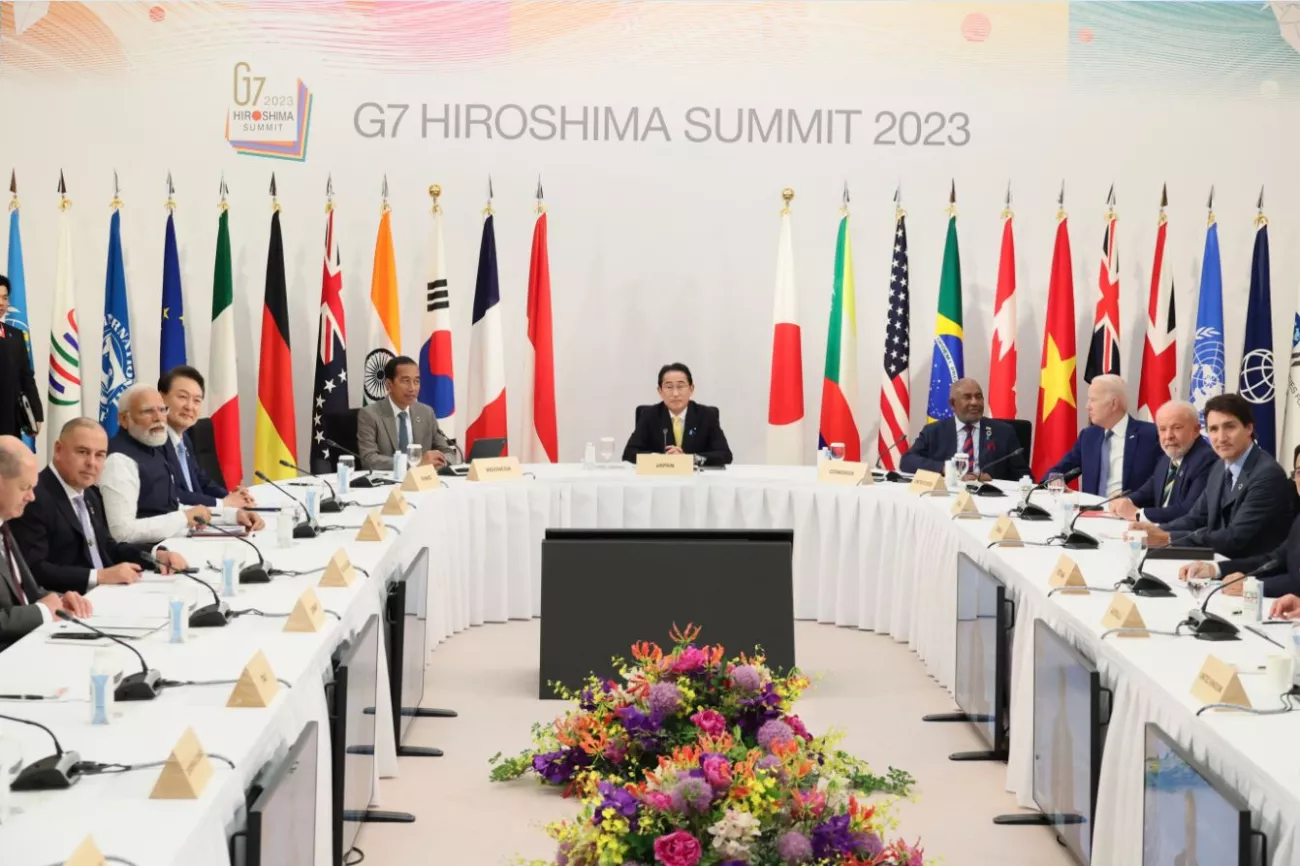
REMARKS BY PACIFIC ISLANDS FORUM CHAIR
The Honourable Mark Brown, Prime Minister of the Cook Islands at the G7 Summit
Session 6 – Working Together to Address Multiple Crises (Food, Health, Development, Gender)
Kia Orana and warm Pacific greetings.
It’s an honour to represent the 18 island nations of the Pacific Islands Forum.
As a collective, our Pacific region contributes less than 0.03 percent to global emissions.
Our emissions are the equivalent of a burning matchstick in a forest fire.
While we continue to use our best efforts and ingenuity to protect ourselves and to protect our ocean, we urgently need developed countries, certainly those within the G7, to deliver on their climate finance commitments, first made in Cancun in 2010, followed by the Paris Agreement in 2015, and today still not met.
That finance must be directed to the most climate vulnerable countries of which many are SIDS in the Pacific.
We continue to face the ongoing onslaught of global climate change, a phenomenon that we did little to contribute to but whose impacts we suffer from the most. Shipping is our lifeline.
More than 90% of our trade, including food, medicines and building materials, reach us by sea.
We already pay the most expensive shipping costs in the world – due to distance and diseconomies of scale.
The measures being proposed by G7 countries for the adoption of IMO operational and fiscal measures would add even more cost to us and seriously jeopardise the livelihoods of our people and our economies.
To borrow the words of the Honourable Prime Minister from Barbados, “poor countries paying the price of wealthier nations.”
Hear us when we say, the proposed IMO measures will severely impact the already costly shipping services available to us and must therefore be assessed from the lenses of our most vulnerable communities.
Again, we call for the attention of the G7 to identify any disproportionate impacts and address them prior to the approval and subsequent adoption of any such measures.
We have been consistent from the outset that any funds raised through a punitive levy, now being considered at the IMO, to be imposed onto shipping must not come at the cost of the SIDS.
Our region, already suffering the highest transport costs, cannot and must not be further penalized by such measures.
It is up to the G20 countries, not least those within the G7, responsible for over 80% of global emissions, that we are beholden to for our survival.
The survival of our people in the Pacific is being held to ransom at the cost of the developed world ensuring the energy stability their society demands, expects, and needs through increased Liquified Natural Gas (LNG) production and long-term LNG shipping contracts through which they can manage the transition over the coming decades to the alternative fuels required for a Net Zero World within 2050.
This is far removed from our region’s aspirations for a Just transition to a fossil fuel free Pacific as articulated in the Port Villa declaration.
In July last year, our Pacific Islands Forum Leaders endorsed the 2050 Strategy for the Blue Pacific Continent.
The 2050 Strategy is our collective vision deeply rooted in the Pacific context, amplifying our united voices in solidarity to support delivery of action-orientated solutions, particularly in the context of accelerated climate action.
The 2050 Strategy will accelerate climate action within our region and serve as a model for inspiring climate action worldwide.
For the Blue Pacific, development finance is critical to achieving our development goals.
As the G7, you are the most influential economic and political grouping in the global order – you have an obligation to lead on climate action – through actions, not just words.
Access modalities to all development financing mechanisms, especially climate finance, need to be reassessed – reform requires G7 leadership.
The Pacific calls on the G7 and Partners to recognise and support the development of the Multi Vulnerability Index, which appreciates the full dimension of vulnerabilities including economic and social, that is faced by our region.
The Pacific has established a Pacific Resilience Fund, one which is tailored to address the needs and vulnerabilities of our region.
We ask the G7 to support the Pacific through investment in the Pacific Resilience Fund.
The Pacific have been leaders in addressing crises faced worldwide.
It was the Pacific that over 30 years ago, called for the establishment of a loss and damage fund, which we celebrated at COP 27 in Egypt last year.
It was Pacific voices that led the call of ‘1.5 to stay alive’ – a call that led to the adoption of the Paris Agreement.
The Pacific was key to the negotiations on the now agreed fisheries subsidies agreement at the WTO, which we strongly urge countries to ratify.
But we alone cannot ensure our survival.
The current food and energy crisis, much like the climate emergency, can only be addressed through our collective global effort.
We the Blue Pacific, stand ready to support these global efforts and we look to the G7 to assume and deliver on its responsibilities as global leaders.
Thank you for your attention.
Kia Orana e Kia Manuia.
